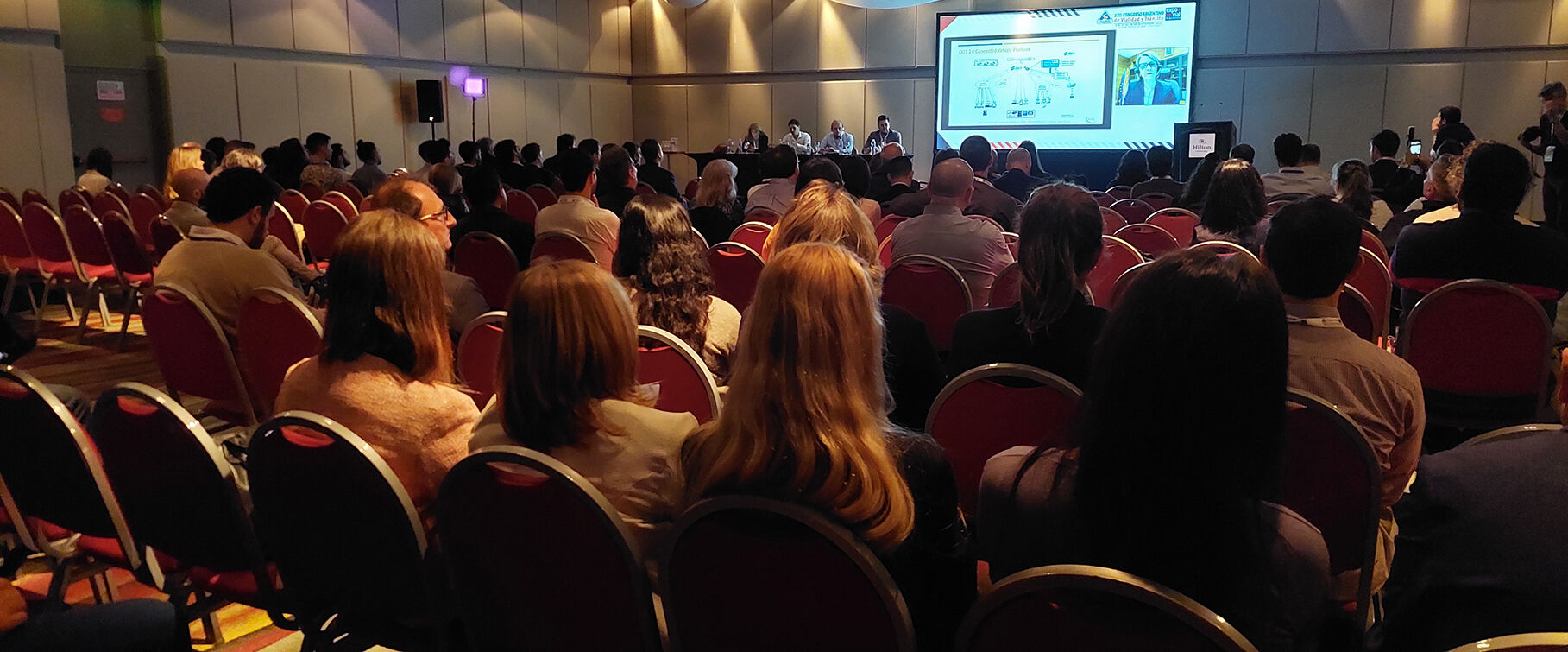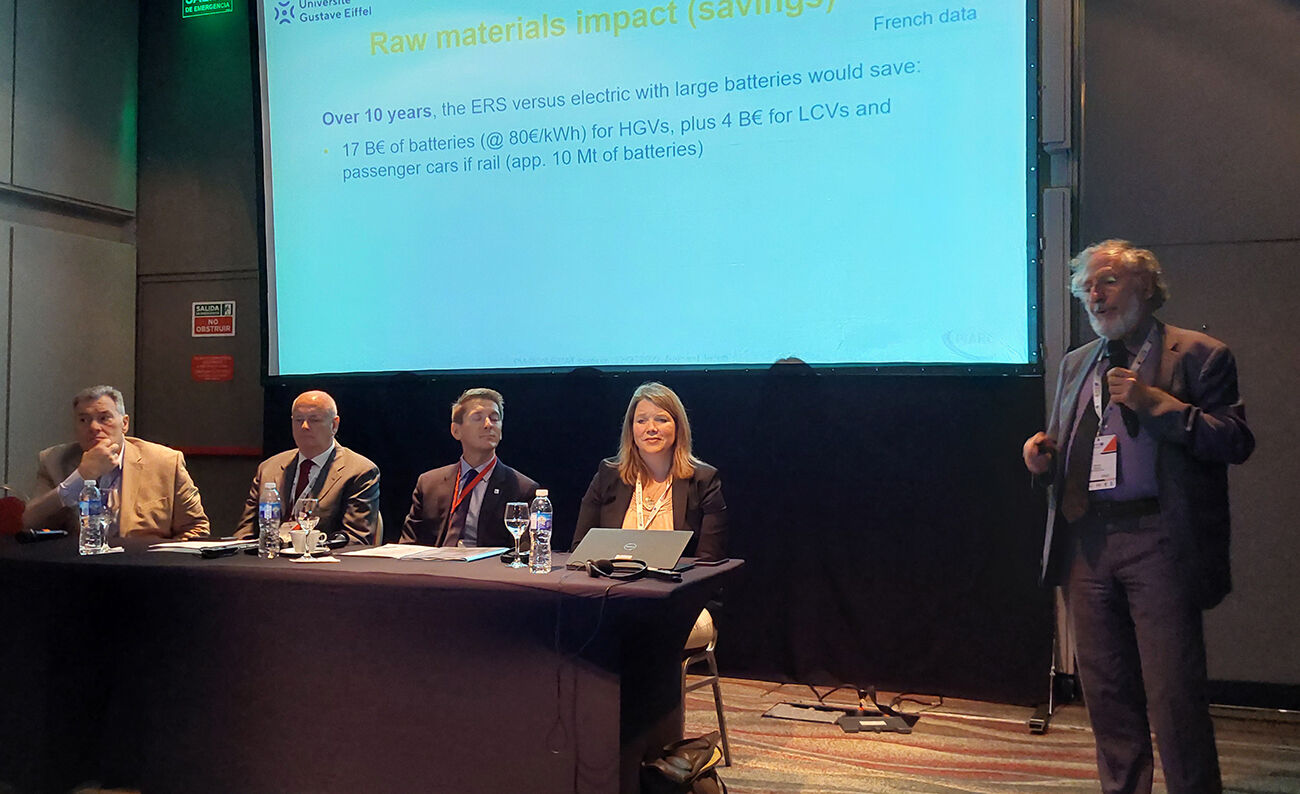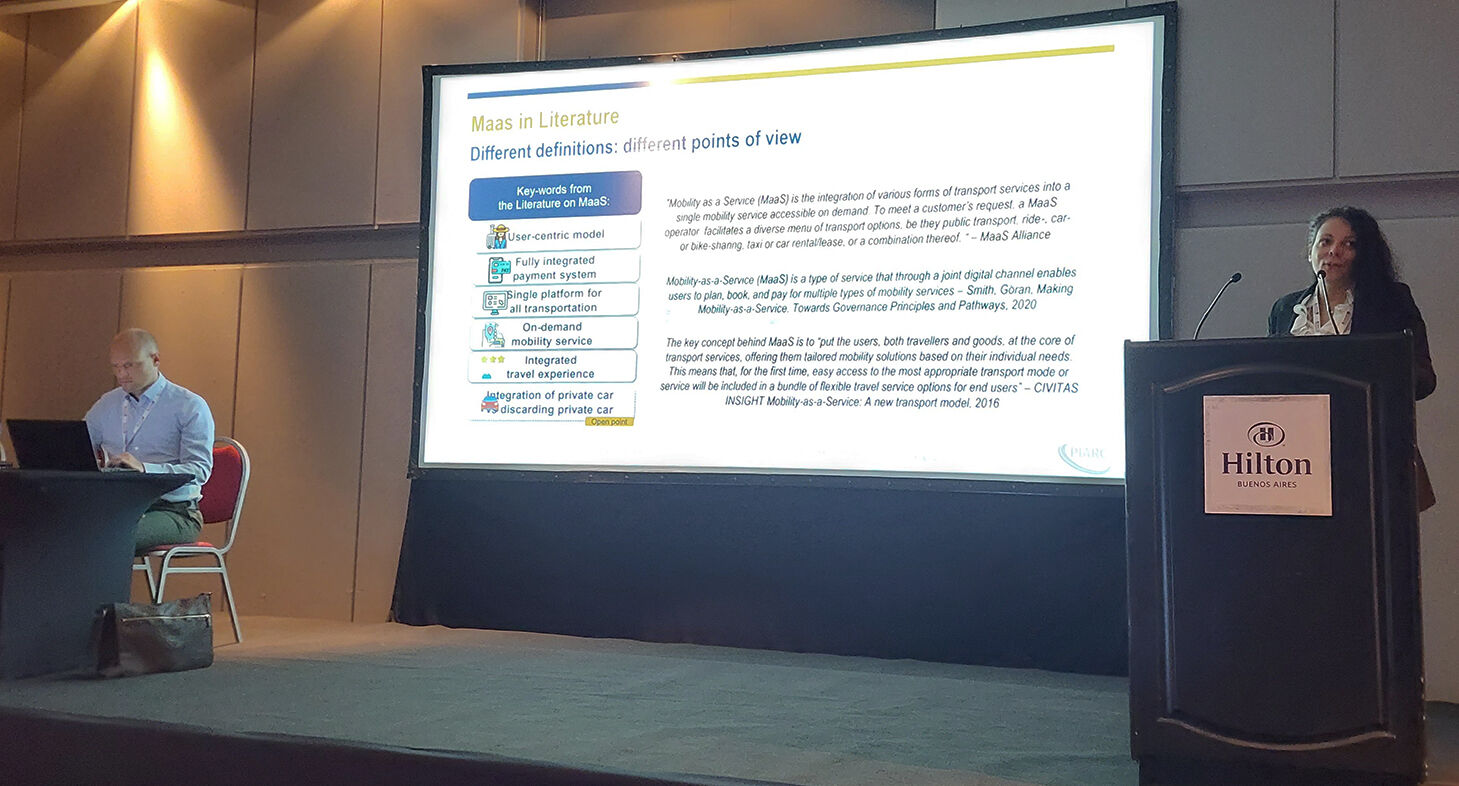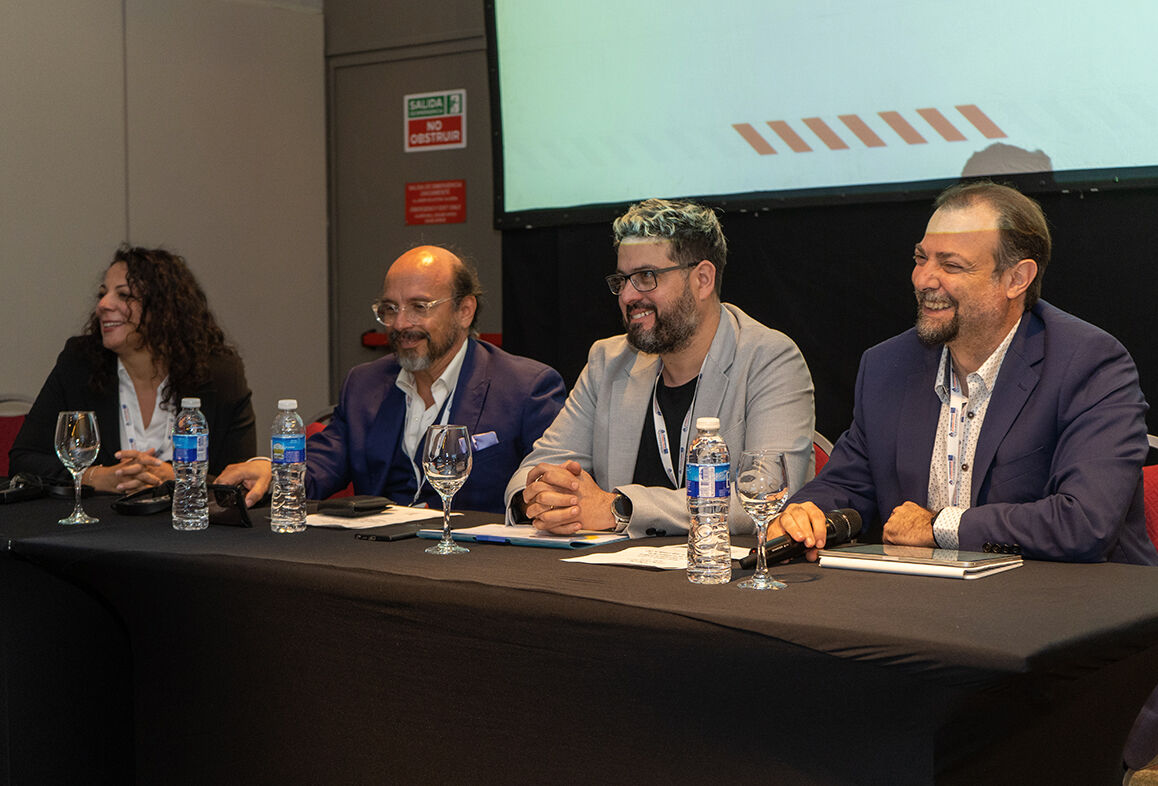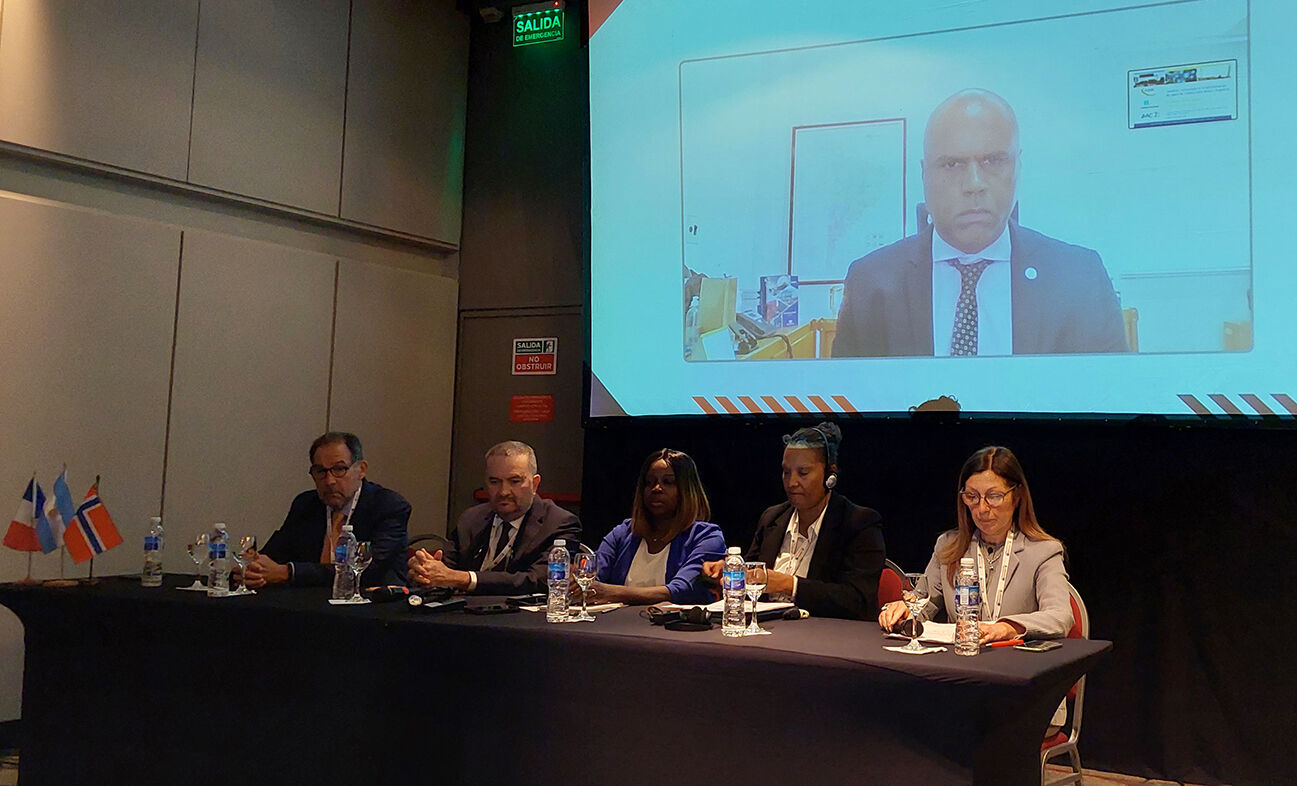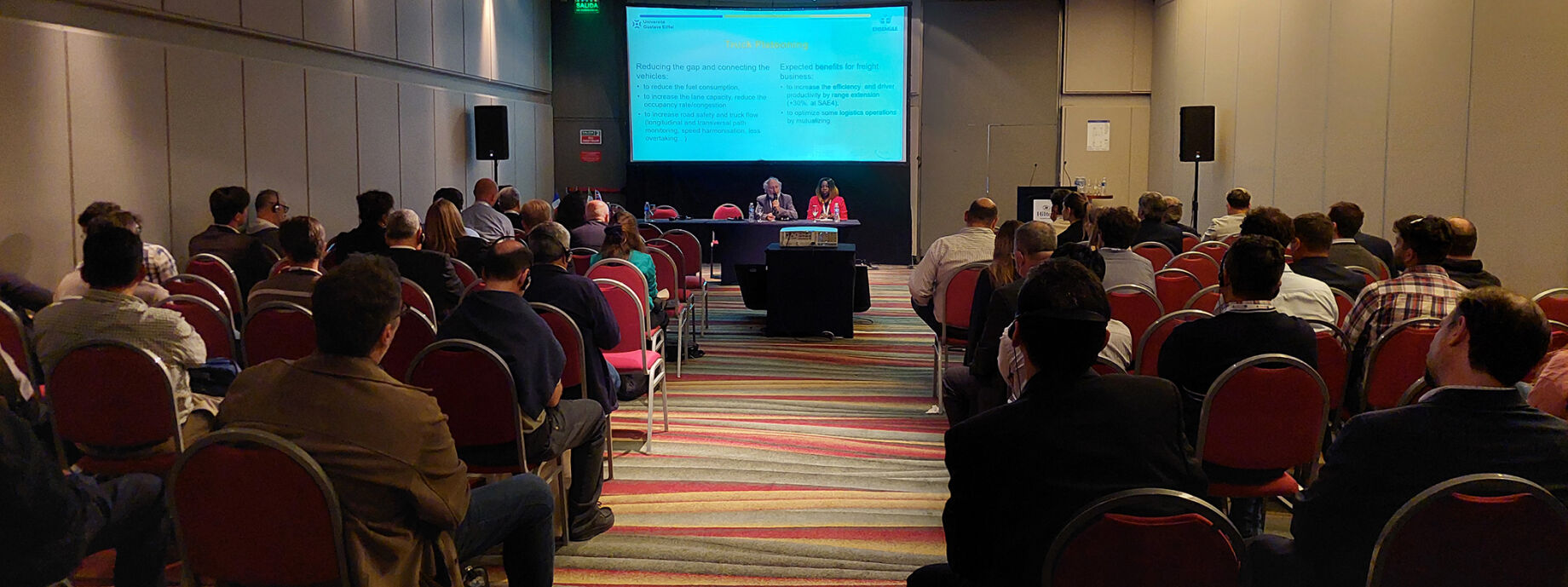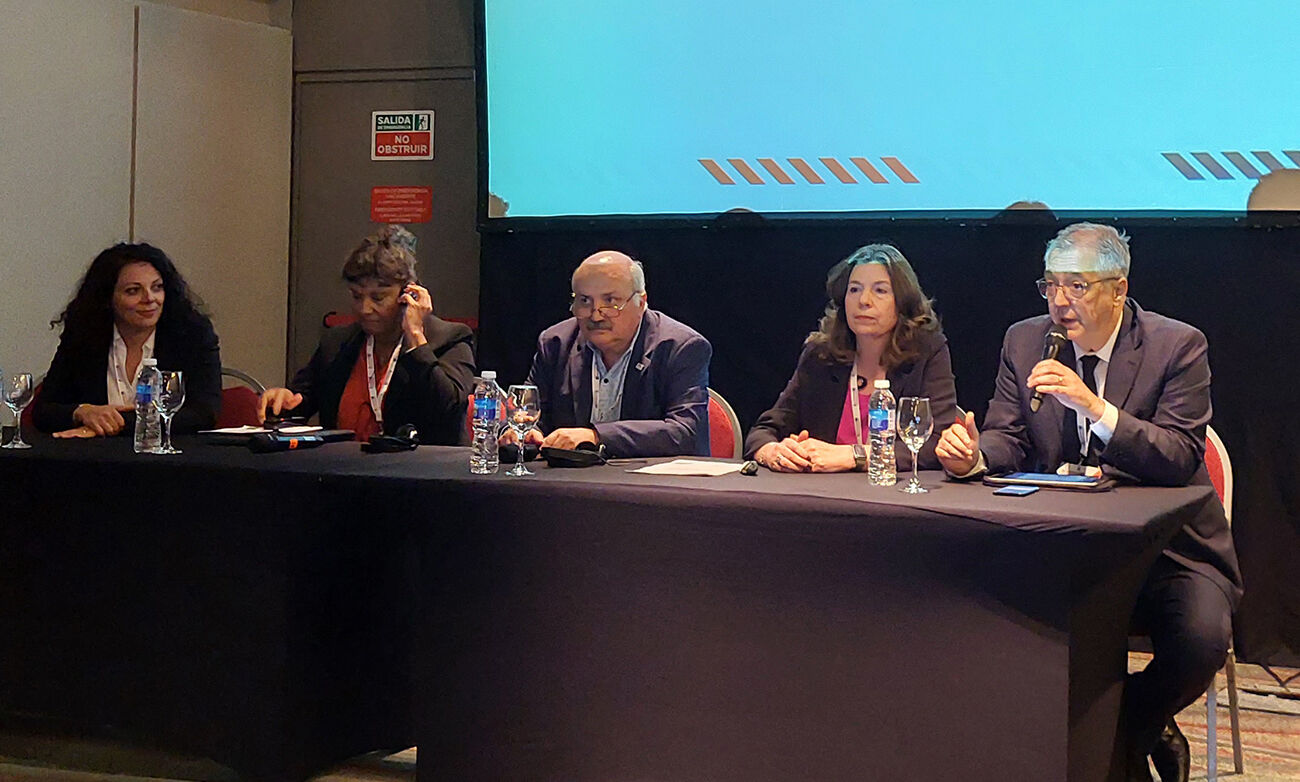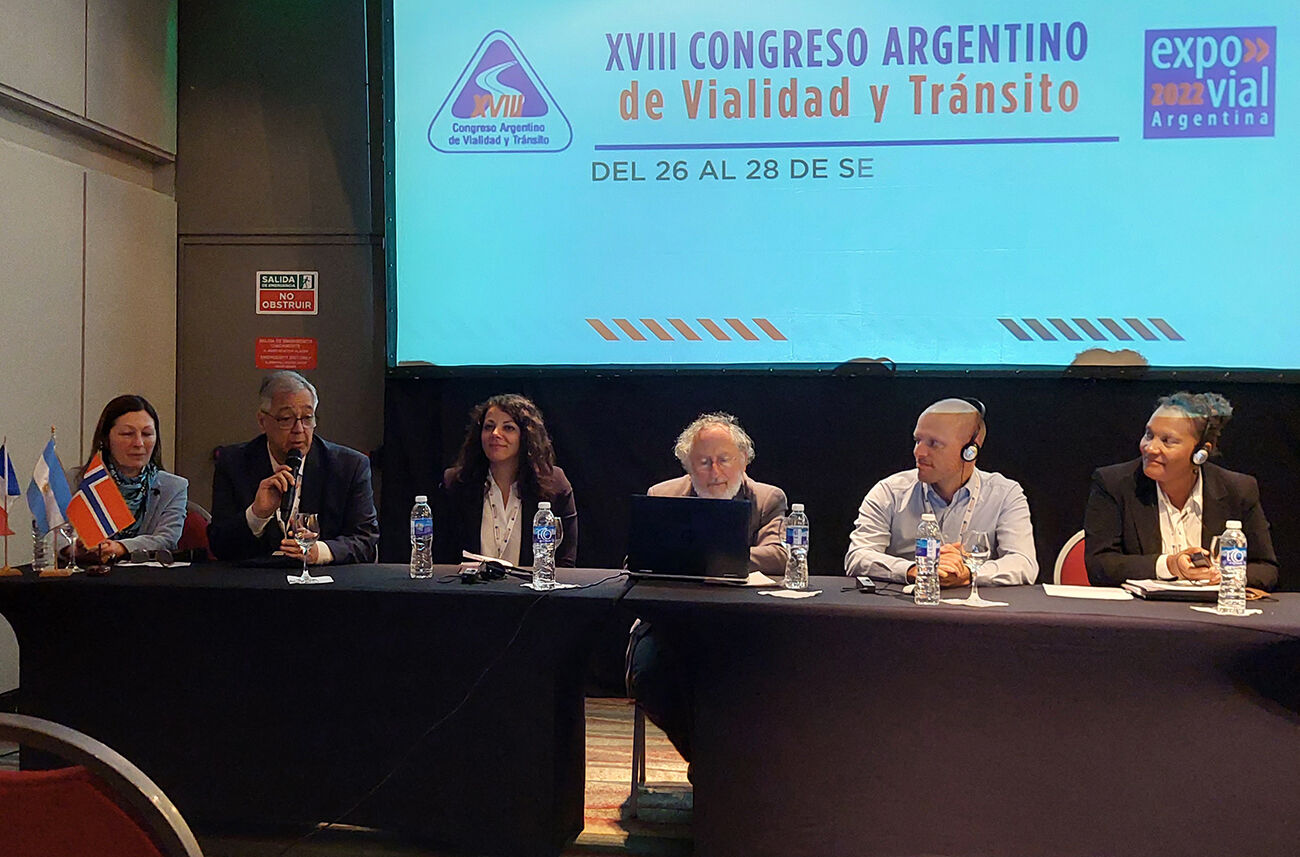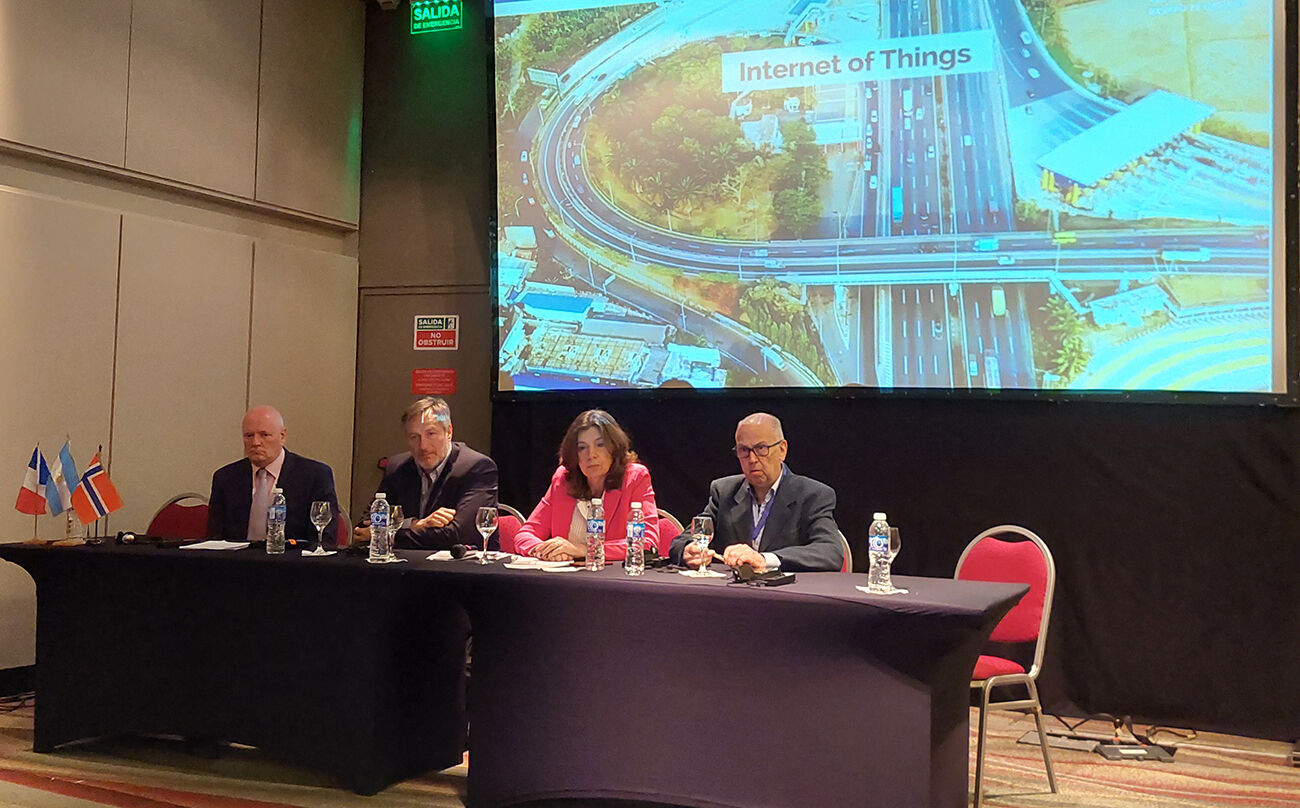International Seminar "Building Smart Approaches for Freight, Road Network Operations and ITS Technology"
26-28 September 2022, Buenos Aires (Argentina)
This International Seminar was organized from September 26th to 28th 2022 jointly by the Technical Committee 2.3 "Freight" and the Technical Committee 2.4 "Road Network Operation/Intelligent Transportation Systems", in the frame of the XVIIIth Argentinian Congress of Road Administration and Traffic in Buenos Aires, Argentina.
Preparatory documents for the Seminar
Frame and objectives
The congress had the topic “Vision 2030: Towards the future of road infrastructure and transport”, which focused on the current challenges and goals of the two participating PIARC technical committees. It delivered fruitful results, discussions and insights from all around the World.
Therefore, the international seminar focused on the two domains (1) freight transportation and (2) road network operation and ITS, and on topics covered by both domains.
In the field of freight transport the following topics where covered:
The freight part of the seminar focused on decarbonisation of and greening freight transport, electromobility and electric road systems (ERS), heavy vehicle weights and dimensions, performance based standards, high capacity vehicles and intelligent access programme (IAP), and enforcement of overloads, and on freight management in and around the cities.
The part on road network operation and ITS focused on Mobility as a Service (MaaS) from the viewpoint of the road operator in various international showcases as well as Cooperative Mobility, ITS and V2X in different countries, and on research an implementation projects. Additional focus was put on data and knowledge sharing to enable and encourage the use of Cooperative ITS.
The topics of common interest focused on ITS related to connected and autonomous heavy vehicles (incl. platooning), to management of trucks in corridors, border crossing, parking lots and supply chain, and how road operators could address freight drivers’ needs through ITS. A session addressed the question: how smart infrastructure can increase road safety?
| International Seminar Program - September 26-28, 2022 Building Smart Approaches for Freight, Road Network Operations and ITS Technology |
|---|
Day 1 - September 26, 2022
Opening PIARC Seminar TC2.3 and TC2.4 | |
8:00-9:00 |
Registration |
9:00-10:30 |
Congress-Electromobility |
10:30-11:00 |
Coffee Break - Visit to Stands / Banners |
11:00-13:15 |
Free time / Meetings |
13:15-14:20 |
Lunch |
Session FI1: Freight & RNO ITS (15:00-16:10) |
Chair - Caroline Mays (USA)
Truck Platooning – European project ENSEMBLE - Bernard Jacob, member of Gustave Eiffel University (France)
Introduction to Autonomous Trucking - Monika Darwish (USA)
Truck Platooning and Automation Trends in the U.S - Virginia Lingham, Transportation Systems Operations Director, ICF International (USA)
- Delegated driving experiments in France - Sylvain Belloche, French Ministry in charge of transport ( France)
Q&A for the session
Session FI2: Freight & RNO ITS (16:10-17:15) |
Chair - Hernán Perez Zarlenga (Argentina)
Addressing Freight Drivers Needs Through ITS - Valentina Galasso, Technical Committe 2.4 Chair, Director at Deloitte Consulting S.r.l. S.B. (Italy)
Enhancing Goods Mobility through Technology- Today and in the Future - Paula Dowell , Associate Vice Président, HNTB (USA)
Operation of Paseo del Bajo Freight Road Corridor (in spanish) - Alejandro Molina, Toll Systems Manager & ITS / urban highways, (Argentina)
- The future of transport: the impact of electric vehicles, connected and autonomous, on freight transport - Miguel Bravo, architect professor, Chairman, Founder, Bravo Motor Company California and Brazil (Argentina)
Q&A for the session
Opening Ceremony of Congress (17:30-18:30) |
|
Welcome Cocktail (18:30-21:00) |
Day 2 (Freight sessions) - September 27, 2022
Session F1: Freight (9:00-10:30) |
Chair - Willy Hughes (Argentina), Co-chair - Alejandra Efron (Argentina)
Evolution of Intelligent Access in Australia - Gavin Hill, General Manager, Strategy and Delivery (Australia)
High capacity vehicles (HCVs) in Finland - Taneli Antikainen, Transport Economist, Finnish Transport Infrastructure Agency (Finland)
The PBS initiative in South Africa - Paul A Nordengen, Director, Heavy Vehicle Transport Technology Africa (South Africa)
- Road transport Operations, an approach from the shippers´ perspective - Edgar Higuera, Logistics, transportation and infrastructure manager, ANDI (Colombia)
Panel discussion - Alejandra Efron (Argentina), Gavin Hill (Australia), Bernard Jacob (France), Taneli Antikainen (Finland), Paul A Nordengen (South Africa)
Coffee Break - Visit to Stands / Banners (10:30-11:00) |
Session F2: Freight (11:00-13:00) |
Chair - Else-Marie Marskar (Norway)
Greening freight – why is it necessary? - Patrick Grassl, Austrian Ministry for Climate Action and Mobility, Department II/7 - Coordination of Logistics Policy (Austria)
Greening freight – is it possible? - Else-Marie Marskar, Chief Engineer, NPRA (Norway)
Approaches to Green Freight Transport - Hinko van Geelen, Senior researcher, Belgian Road Research Centre (Belgium)
- Electromobility: Clean and Low Cost? (in spanish) - Claudio Damiano, Transport Institute - Researcher (Argentina)
Electric Road System: Assessment in France and Situation in Germany - Bernard Jacob, Gustave Eiffel University (France) & Jens Dierke, BAST (Germany)
- High Power and Dynamic Wireless Charging of Electric Vehicles (EVs) - Omer Onar, Vehicle Power Electronics Research Group, Oak Ridge National Laboratory (USA)
Panel discussion
Lunch (13:15-15:00) |
Session F3: Freight (15:00-16:30) |
Chair - Hinko van Geelen (Belgium)
Truck Traffic Regulation around big Cities - Tolling Use Cases - Olivier Quoy, (CEDR/PIARC), CEO of Atlandes, A63 motorway (France)
Distribution of goods in cities - Challenges and Trends (in spanish) - Maximiliano Parisi (Argentina)
The role of freight demand management in and around cities - Jose Holguin-Veras, President, Pan-American Society of Transport Research (USA)
Q&A for the session
Coffee Break - Visit to Stands / Banners (16:30-17:00) |
Session F4: Freight (17:00-18:30) |
Chair - Bernard Jacob (France)
WIM for Direct Enforcement - Best Practices, Overload mitigation on bridges - Bernard Jacob, Technical Committee 2.3 "Freight", French speaking Secretary, Gustave Eiffel University (France), Jens Dierke (Germany), R. Meschede (Germany) & Ivan Kříž (Czechia)
Implementation of WIM for Direct Enforcement in Brazil - Gustavo Otto, Researcher at LabTrans/UFSC (Brazil)
Development of WIM Dynamic Weighing in Brazil - Leonardo Guerson, member of Intercomp (Brazil)
- Argentinian Technical Requirements for Direct Enforcement - Javier Jorge, National Institute of Industrial Technology (Argentina)
Intelligent Truck Weight Monitoring: Texas Regulations - Jolanda Prozzi, Division Head: Multimodal Planning and Environment, Texas A&M Transportation Institute (USA)
Panel discussion - Tom Kearney (USA), Paul Nordengen (South Africa), Bernard Jacob (France), Gustavo Otto (Brazil), Javier Jorge (Argentina), Leonardo Guerson (Brazil)
Day 2 (RNO ITS sessions) - September 27, 2022
Session I1: RNO ITS (9:00-10:30) |
Chair - Martin Margreiter (Germany)
How can road operators deal with the MaaS paradigm? - Valentina Galasso, Chair of Technical Committee 2.4 "Road Network Operation / Intelligent Transportation Systems", Director at Deloitte Consulting S.r.l. S.B. (Italy)
Implementing MAAS in Québec : Issues, challenges and opportunities - Claude Sirois, Team Leader in Innovative Mobility, Québec Ministry of Transportation (Canada)
Sheard mobility – the foundation of MaaS “The Norwegian roadmap for urban sustainable transport and micromobility towards 2033.” - Arve Kirkevold, Chief engineer and project manager at Norwegian Public Roads Administration (Norway)
- UK Future Transport Zones and MaaS solutions - James Elliott, Director, Elliott Asset Management (United Kingdom)
Panel discussion - Valentina Galasso and Alejandro Molina
Coffee Break - Visit to Stands / Banners (10:30-11:00) |
Session I2: RNO ITS (11:00-13:00) |
Chair - Mario Aguirre (Argentina)
Status of V2X in the USA - Galen Mc Gill, Oregon DOT, Maintenance and Operations Engineer (United State)
European C-Roads platform - Marie-Christine Esposito, Chair of the C-Roads Platform (France)
Experiences of Faculty of Engineering (in spanish) - Sebastián Canziani, School of Engineering, University of Buenos Aires (Argentina)
Simulation of Traffic Systems (in spanish) - Jorge Felizia, Secretary of ITS Argentina (Argentina)
- The future of Cooperative ITS - Jianming Ma, Director of Traffic Management, Texas Depart. of Transportaion (United State)
International Cooperation Autonomous Mobility Deployment in Australia - Clarissa Han, Chief Technology Leader of Australian Road Research Board (Australia)
Q&A for the session
Lunch (13:15-15:00) |
Session I3: RNO ITS (15:00-16:30) |
Chair - Silvina Crivelero (Argentina)
DGT 3.0 Connected Vehicle Platform - Ana Luz (Spain)
COVID-19 Impact on Traffic, Public Transport and Road Maintenance - Singapore - Koh Wee Ping / Chandrasekar, Deputy Director and Deputy Chief Specialist, Group Director (Singapore)
Operation of National Road Corridors (in spanish) - Gonzalo Atanasof (Argentina)
- Automated Traffic Test Bed Data for Cooperative Mobility - Martin Margreiter, Head of TUM Research Group Automated Traffic, Partner at MobilityPartners (Germany)
AUSA MAPS: Intelligent Management of ITS Road Asset (in spanish) - Leandro Anibal (Argentina)
Q&A for the session
Coffee Break - Visit to Stands / Banners (16:30-17:00) |
Session I4: RNO ITS (17:00-18:30) |
Chair - Andrés Panero (Argentina)
The Rno-ITS online resource - Jennie Martin, WG leader Technical Committee 2.4 "Road Network Operation / Intelligent Transportation Systems" (United Kingdom)
Public Private Sector Collaboration -Accelerating Freight Mobility - Paula Dowell, Associate Vice Président, HNTB (United State)
Importance of RNO and ITS manual in Latin America (in spanish) - Daniel Russomanno, Technical Secretary, Technical Committee 2.4 "Road Network Operation / Intelligent Transportation Systems", PIARC (Argentina)
- Multi Lane Free Flow (in spanish) - Michele Ganz, Commercial Director Americas (Italy)
Q&A for the session
Day 3 - September 28, 2022
Session FI3: Freight & RNO ITS (9:00-10:30) |
Chair - Silvia Sudol (Argentina)
Challenges and solutions to manage Border Crossings between Brazil and Argentina (in spanish) - Wilsimar Garcia, Tax Auditor / Customs Delegate of RFB Uruguayana (Brazil)
Overview of the Truck Parking Development Handbook - Tiffany Julien, Transportation Specialist, USDOT – Federal Highway Administration (United State)
Innovative ITS for Truck Parking along Motorways in Germany - Jens Dierke, Research Associate, Federal Highway Research Institute BASt (Germany)
- Managing Texas/Mexico Border Crossings - Caroline Mays, Director, Planning and Modal Program, Texas Department of Transportation (United State) & Juan-Carlos Villa, Program Manager, Texas A&M Transportation Institute (United State)
We have the data... and now what? A practical guide to logistics corridor management (in spanish) - Carlos Santillàn Doherty, (Mexico)
Q&A for the session
Coffee Break - Visit to Stands / Banners (10:30-11:00) |
Session FI4: Freight & RNO ITS (11:00-12:30) |
Chair - Emma Albrieu (Argentina)
ITS in Network of Long Road Corridors (in spanish) - Daniel Mofa, (Argentina)
Lighting telecontrol in Argentina (in spanish) - Pablo Servent, CEO Smartmation S.A. (Argentina)
Road safety considerations on active modes and freight - Hinko van Geelen, Senior researcher, Belgian Road Research Centre (Belgium)
- Vision Zero: A Local Perspective To Planning and Traffic Operations - Gush Khankarli, Director, Department of Transportation (United State)
ANAS Smart Road: Fasten your "Smart" belt - Luigi Carrarini, Head of Centre of Excellence Smart Road & SHM – Anas S.p.A. (Italy)
Q&A for the session
Closing PIARC Seminar of Technical Committee 2.3 & Technical Committee 2.4 (12:30-13:00) |
Conclusions and Perspectives - Bernard Jacob, French speaking Secretary of Technical Committee 2.3 "Freight", Task Force 2.2 ", Electric Road Systems (ERS)", CTERM, Gustave Eiffel University (France)
Conclusions Sessions - Martin Margreiter, Member of Technical Committee 2.4 "Road Network Operation / Intelligent Transportation Systems", Head of TUM Research Group Automated Traffic, Partner at MobilityPartners (Germany)
Chair of Technical Committee 2.4 "Road Network Operation / Intelligent Transportation Systems" - Valentina Galasso, Director at Deloitte Consulting S.r.l. S.B. (Italy)
- English speaking Secretary of Technical Committee 2.3 "Freight" - Tiffany Julien , Transportation Specialist, USDOT – Federal Highway Administration (United State)
Lunch + Technical Visit (13:15-16:00) |
Congress Closing Ceremony (17:15-18:30) |
Output and Conclusions
The presentations and discussions highlighted the following key outcomes:
• Collection of good practices to cut CO2 emissions of freight transport: less emitting vehicles and alternative fuels, electrification, reduced demand of freight transport, improving the vehicle and infrastructure efficiency. Electric road system (ERS) proposes a set of promising technologies (overhead and ground conduction or induction) on motorways, investigated in Sweden, Germany, France, Italy, the USA, Japan and South Korea. Battery electric vehicles (BEVs) and stationary charging stations are more suitable for urban freight. Policy regulations and road pricing, zero emission zones and adapted vehicles (electric robots, cargo bikes, etc.) are complementary solutions for greening freight transport. Some attention should be paid to the electricity which should remain green and as much as possible renewable.
• High capacity vehicles (HCVs) enables a reduction in transport costs (more than 10%) and emissions with less trips and mileage, alleviate driver shortage, and improve competitiveness and logistical efficiency, above all for bulky freight. No safety issue was noticed. Route specific permits are issued for these vehicles. Pavement wears decrease with more and lighter axles, while some bridges should be strengthened or avoided. Performance based standards (PBS) enable certifying HCVs with respect to performance criteria on road and vehicle safety, and infrastructure wear mitigation. Intelligent access programme (IAP) complements this approach, defining the routes and conditions proposed to HCVs, monitoring them, and taking advantage of connected vehicles and data exchanges between vehicles and infrastructure.
• WIM for direct enforcement is on the wheels in several European countries (BE, CZ, HU, DE, FR) and in Latin America (BR, AR), and may significantly reduce overloads ensuring a better compliance with the current regulations, and thus increase the infrastructure durability and safety and reduce unfair competition between freight modes and transport companies. However, some legal and certification issues remain to overcome. Moreover, virtual WIM stations coupled with automatic vehicle identification (AVI) help the enforcement of overloads. On-board weighing (OBW) coupled with GNSS is also a promising technology.
• Truck platooning (European project ENSEMBLE) has potential for reducing road congestion, mitigation driver shortage, improving freight efficiency and road safety, and reducing CO2 emissions of long haul fleets. A few trials were carried out or are still planned in Europe, above all on delegated driving. However, there are yet some regulation, legal and liability locks to overcome before implementing autonomous trucks (level SAE 4) in platoons on motorways in dense countries (e.g. Europe). Some good practices are reported in the USA. Even if platooning seems it the bottom of the Hype cycle, advanced driver assistance and truck automation are on the wheel.
• The demand management allows increasing economic productivity, efficiency, and enhancing sustainability. It is necessary to develop freight efficient land-use. Tolling is a tool for truck traffic regulation around cities.
• It became clear that for the implementation of MaaS the main aim is the interoperability of the different platforms and the availability of one single point of access for customers and services.
• Additionally, it became clear that there also needs to be a focus of how MaaS can work in rural areas as well.
• In the various showcases presenting the current status and developments in the field of V2X and cooperative ITS around the globe it became clear that the approaches are becoming much more mature and showcases are now turning into real-world applications and implementations.
• The implications of the reduction of frequency band allocation for automotive applications in US have to monitored in the future.
• Various projects being presented also focused on the interface and interaction between connected mobility and road tolling systems.
Bernard Jacob (Technical Committee 2.3 "Freight") and Martin Margreiter (Technical Committee 2.4 "Road Network Operation / Intelligent Transportation Systems")
